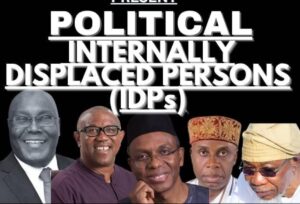

In the ever-dramatic theatre of Nigerian politics, few figures command as much attention or controversy as former President Olusegun Obasanjo. As a two-time head of state, Obasanjo has played the roles of kingmaker, critic, and conscience of the nation. But perhaps no two political actors have tested his principles and patience more than his former Vice President, Atiku Abubakar, and ex-Federal Capital Territory Minister, Nasir El-Rufai.
 Today, both men once estranged, now newly allied, are frontlining a coalition that many Nigerians view as unholy. It is an alliance of strange bedfellows, united not by ideology or vision, but by mutual resentment and ambition. At its core, it is a coalition of the aggrieved, a partnership of political actors seeking relevance, not reform.
Today, both men once estranged, now newly allied, are frontlining a coalition that many Nigerians view as unholy. It is an alliance of strange bedfellows, united not by ideology or vision, but by mutual resentment and ambition. At its core, it is a coalition of the aggrieved, a partnership of political actors seeking relevance, not reform.
Atiku Abubakar’s time as Vice President from 1999 to 2007 was marred by internal conflict. Though elected on the same ticket with Obasanjo under the People’s Democratic Party (PDP), their relationship quickly deteriorated. Obasanjo publicly accused Atiku of corruption, insubordination, and undermining his government.
In a widely quoted moment of candour, Obasanjo declared:“If I support Atiku for the presidency, may God never forgive me.”
Though he appeared to temper his stance in 2019, many regarded it as political pragmatism rather than a genuine change of heart. To Obasanjo, Atiku symbolizes a brand of politics that is transactional, self serving, and devoid of a larger national vision.
Nasir El-Rufai, once hailed by Obasanjo as an intelligent technocrat, has also fallen out of grace. In his memoir My Watch, Obasanjo wrote of El-Rufai as:“A brilliant technocrat who allowed his ambition to outgrow his wisdom.”
He further accused him of “pathological pettiness and betrayal,” alleging that El-Rufai used his time in government not for service, but for vendetta and self-promotion.
More recently, El-Rufai has rebranded himself as a northern political jingoist, frequently courting controversy with divisive rhetoric. His sudden alignment with Atiku Abubakar, whom he once criticized has raised eyebrows across the political spectrum.
This new alliance is not built on shared ideology or national interest. It is a coalition of convenience, formed in the wilderness of political exile. It is ambition disguised as unity, a calculated rescue operation by what President Bola Tinubu aptly described as “IDPs”(Internally Displaced Politicians).
To many Nigerians, the Atiku-El-Rufai led coalition is a threat to democratic integrity. It represents politics without principle, strategy without service, and ambition without honour. It is governance driven by personal grievance rather than public good, a desperate arrangement by politicians who failed to achieve their goals independently and now seek validation through joint ambition.
Obasanjo’s warnings, however controversial should not be dismissed. With his institutional memory and deep insider knowledge, his verdict on these two political figures carries weight. Nigeria cannot afford another cycle of recycled political desperation and vindictiveness in the guise of coalition
As the 2027 elections approach, Nigerians must critically evaluate candidates, not by alliances or slogans, but by character, competence, and past conduct. Leadership must not become a second chance for those who misused the first.
In contrast, President Bola Ahmed Tinubu continues to exhibit capacity, competence and commitment in governance. Despite prevailing challenges, his administration is laying down essential reforms and foundations that must be strengthened and sustained beyond 2027 for the sake of national progress.
If yesterday’s frustrated politicians become tomorrow’s frontrunners, then the future is at risk. Nigeria’s future must not be bargained away in the name of any coalition of convenience.
Musa Asiru Bakare
Foundation Member, All Progressives Congress (APC),
Political Analyst writes from Lokoja, Kogi State
